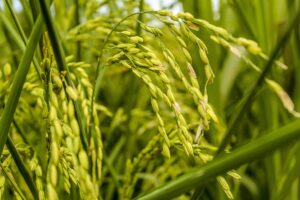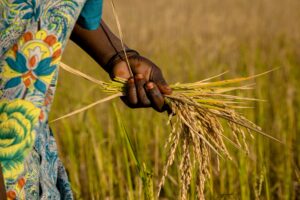Without a doubt, food is vital to our survival. It plays as much a key role in our nutrition as it provides economic support to many people. Among those people are Olive and her community in the East-African country of Rwanda. Some of you may have first heard the story of Olive in 2018 when Gish participants raised money to help her community start a cooperative farm and market. Now, three years later, that story continues to evolve.
 How it Started: Change a Life 2018
How it Started: Change a Life 2018
For Gish’s Change a Life Item in 2018, Giles Duley told the story of Olive, a survivor of the Rwandan genocide. In 1994, a conflict between two warring parties escalated into a massacre that ultimately cost over 800,000 Rwandans their lives. On that day, a few miles away, Olive was in the hospital giving birth to her third child. Like many others in the community, Olive lost her family that day.
Olive eventually returned to the village, where she and the other surviving women started farming potatoes to support their families. But the work yielded little profit, and the women began dreaming of creating a cooperative farm and market. That dream became reality in 2018 when Gishers combined their forces and raised more than $266,000. The raised funds enabled Random Acts and the Legacy of War Foundation to provide farmland and the resources to establish a cooperative farm and market. Today, Olive and her community are thriving entrepreneurs with their own farming cooperative.
Land for Women
In June 2019, the Legacy of War Foundation helped establish the Icyizere Ruhanga Cooperative. Comprising 50 women, it was the first Land For Women cooperative farm. Land for Women provided the needed legal support and purchased a plot of land (19,929 sqm) the women could use for allotment farming. Through Land for Women, many women could start a business and take control of their own livelihoods.
Sharing Knowledge: A New Training Curriculum
 Land for Women planned a training curriculum that will be delivered over the course of three years. The program is set to start in 2022 and aims to provide women with vital knowledge about agriculture and farming.
Land for Women planned a training curriculum that will be delivered over the course of three years. The program is set to start in 2022 and aims to provide women with vital knowledge about agriculture and farming.
In August 2021, Land for Women held a ten-day introduction with the current women’s cooperatives in Rwanda. The goal was to provide the women with an overview of agricultural concepts and techniques before the start of the agricultural cycle. Two cooperatives, a total of 62 women, cultivate the farm: the Icyizere and Imboni cooperatives. The two cooperatives have different prior knowledge of agriculture, so the training is tailored to their specific needs.
The entire training curriculum is a three-year program of practical and theoretical parts. It includes 15 modules that include planning the agricultural season, biodiversity, food security, finance and business development skills, and literacy.
The training also includes a “Training of Trainers” element. The goal is to build up a group of educators capable of delivering the curriculum to new Land for Women cooperatives and other farmers in the community. Additionally, the women will hold scheduled cooking and nutrition workshops. Land for Women wants to enable the women to share their knowledge of food and nutrition with women in the wider community.
